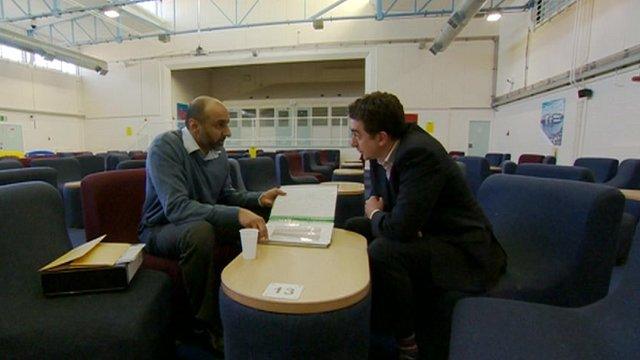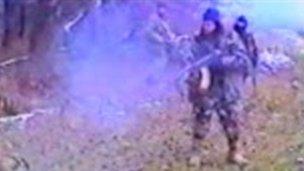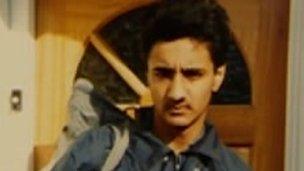The battle to prosecute Babar Ahmad
- Published

Mr Ahmad is held in a special unit for people facing extradition on terrorism-related charges
If we didn't know already, the hour of security checks at Long Lartin Prison was a reminder that this was going to be no ordinary interview - but then, Babar Ahmad is no ordinary interviewee.
He is the man the government said the BBC couldn't meet, but we challenged that decision in the High Court and won. Judges said his story should be seen and heard.
No British citizen in modern times has been held longer without trial. In days he will discover his fate as the European Court of Human Rights decides whether he - and other terrorism suspects - can be extradited to the United States.
The US says he should face justice on their side of the Atlantic, but he says he has been the victim of an abuse of process and should be tried in the UK. It is a case right at the heart of the debate over extradition.
"I have been in prison now for nearly eight years without trial," he says. "I am facing extradition to the US to spend the rest of my life in solitary confinement. I have never been questioned about the allegations against me. I have never been shown the evidence against me.
"I do not hold the Americans responsible for anything that has happened to me but I think it is fair to say that I am fighting for my life - and I am running out of time."
Babar Ahmad is 37. He was detained months after his 30th birthday.
He is held on what is called the detainee unit, a special wing for just six Muslim prisoners, who all face extradition as terrorism suspects.

Babar Ahmad's police mugshot from 2003
"Eight years without trial is like living on death row. It's like you are living every day for a tomorrow that might or might not come. And it has been very, very difficult.
"It's just not knowing: there are prisoners all around me who have release dates. Even if it is 10 years ahead of them, they have a date. Detention without trial is the most unimaginable type of psychological torture."
Babar Ahmad was first arrested in December 2003 in a major Scotland Yard counter-terrorism operation. Officers were briefed that he was providing logistical and financial support to terrorists abroad.
Days later, he was released without charge - accusing the arrest team of assault. The Metropolitan Police later admitted he had been injured and paid him £60,000 compensation. The officers involved were prosecuted and acquitted.
In August 2004, he was arrested again. This time he was wanted by America.
The US indictment accused him of heading a "terrorism support cell" that provided material support to the Taliban and Chechen mujahideen.
Federal officials in the state of Connecticut, where Babar Ahmad was wanted, hailed the arrest as a triumph for extradition co-operation.
At the heart of the US case is a website called Azzam.com.
It was probably the first site in English dedicated to the mujahideen. It distributed videos and books to whoever sent payment to a mysterious London box address.
Evan Kohlman is a New York-based internet extremism consultant who is likely to give evidence if Babar enters the dock in America.
"There had never been a site like this," he said.
"They were not internet mujahideen, they were real mujahideen. Azzam had correspondents in every major jihadi conflict out there. Everything from Bosnia, to Chechnya, to Afghanistan.
"Even today there are very few websites out there that have the credibility that Azzam publications still has now."

Russian Hell: An infamous video distributed by Azzam.com
Its gory films told the stories of Muslims who had laid down their lives - largely by showing what remained of them.
Another well-known Azzam film covered fighting in Chechnya, another major mujahideen cause. In one sequence, a shell-shocked Russian soldier falls over exhausted. The Chechen commander machine-guns him to death. The editor mixed the death scene with devotional music.
"You immediately understand why this video was made," said Mr Kohlman. "This was going to appeal to people who are so angry that seeing people being murdered on camera, even soldiers, is something that is inspiring."
I asked Babar about this film.
"If [there was] anything relating to these websites that broke any law of the UK, I don't understand where, for the last 16 years, the police and Crown Prosecution Service have been?"
But what did he think of the morality of it, the decency of showing a man's death?
"Well something like that is a war crime, I don't support wanton killing of captured prisoners of war, that did not happen in Bosnia."
Babar's Bosnia
Babar Ahmad says the right place for him to answer criminal allegations is in a British court.
But in our interview, he revealed he was not just another Muslim growing up in a changing world. As a teenager he had been prepared to fight for a cause: Bosnia.

The young Babar Ahmad travelled to Bosnia
In 1992, he left the comforts of middle-class London because he was shocked by the reported ethnic cleansing of Muslims.
"It was just horrific, the accounts that I had heard about the atrocities that were taking place, women and children being killed, rape camps, concentration camps. I felt compelled to do something about it."
The Bosnian Army made good use of foreign volunteers. Babar Ahmad fought on-and-off for three years in trenches, mountains and snow. He suffered shrapnel wounds in a marketplace blast, but he has no regrets.
"I helped to defend women and children. I felt that I was doing something right. Everyone was just sitting, the international community were sitting having conferences and talks. Nobody was actually doing anything to stop the slaughter of the innocents."
The war had been a turning point for Muslim political identity in the West. Many young people signed up to the idea of a global brotherhood under attack. In time, al Qaeda tapped into the anger of some young Muslims to recruit for its version of jihad.
Babar Ahmad said he was motivated by basic humanity - but I asked him about jihad.
"If by jihad you mean defending yourself and your home and your family, then of course I support that. Every human being should have the right to defend their home and family and themselves.
"But if one means by that attacking innocent people, or blowing up nightclubs or violence [for political reasons], then I don't support that.
"I absolutely refute reject any allegation that I supported terrorism in any way in any place whether in Afghanistan, or Chechnya, or any other part of the world. I believe terrorism to be wrong and I believe the targeting and killing of innocent people to be wrong."
The European mujahideen moved from Bosnia to the war in Chechnya. Babar Ahmad said he arrived after fighting had ended and worked in an orphanage.
But in the wake of 9/11, security agencies in the West frantically searched for jihadist threats - and they started with what they saw as the roots. Azzam and its network came onto the radar.
The American case
So how did the Americans build a case for extradition?
Azzam didn't hide the fact that it was operated from London - but in cyberspace terms, it existed on servers in Trumbull, a small Connecticut town about an hour's drive from New York.
US prosecutors say records at this Connecticut ISP showed that Azzam was operated from Imperial College London, where Babar Ahmad worked in IT. In public documents, they say that their further investigations, and the material seized by the Metropolitan Police, linked the website to Mr Ahmad.
So the alleged offences began on computers in London - but the website was based in the US, and that's why its prosecutors say Babar Ahmad should face justice in their courts.
Babar Ahmad alleges his extradition would be unfair because he has been a victim of an abuse of process in the UK.

A matchstick mosque built by Babar Ahmad in prison
"After my first arrest in 2003, the police did not pass all the case information to the CPS for them to consider putting me on trial in this country," he said.
"Instead someone made a decision to outsource my case to the Americans and ask them to seek my extradition and as a result I have been in prison for nearly eight years without trial."
In a letter last November, the CPS told Babar Ahmad's lawyers that they had considered only "small number of documents seized by the Metropolitan Police" - and never saw everything in the US prosecutors' possession.
In a statement, the CPS told the BBC: "The entirety of the evidence was never subject to review in this country as it formed part of the case built by the US and was held there."
Babar Ahmad's lawyers says the US case overwhelmingly relies on material seized in London following the 2003 arrest - and the CPS should have considered that material.
The US claim of jurisdiction is wider than just the location of Azzam.com's webservers. They allege that a US navy sailor passed a classified document to Azzam that could have endangered battleships in the Gulf.
In 2006, the then attorney general said Babar Ahmad could not be prosecuted over the document, which had been seized in London.
Triumph of extradition
It is these exceptionally unusual circumstances that have made Babar Ahmad's case so controversial. So where should Babar Ahmad be tried?
Admiral James Loy, Deputy Secretary of Homeland Security in Washington when Babar Ahmad was arrested, says the US and UK had woken up to the threat of international cyber-terrorism - and the allies' 2003 Extradition Treaty is one of the key weapons against such threats.
"Back in 2003 it became pretty clear Mr Ahmad had used websites in Connecticut with material which had transgressed across the line of transnational terrorism laws," he said.
"If the law is violated is a law in the United States, the legitimacy goes without question. This is a new realm, this is a new era that demands international co-operation associated with crimes that have international implications: The Ahmad case is that case."
Babar Ahmad's supporters say the handling of his case has been a prime example of extradition unfairness.
An independent review of extradition for the Home Office concluded that the deal with the US is fair - and that British judges don't need powers to decide where someone can be tried.
Home Secretary Theresa May is studying its findings - but ministers are alive to backbench concerns. Prime Minister David Cameron raised the workings of the treaty in his recent talks with President Obama.
Caroline Lucas MP has asked questions in the Commons about the police's handling of Babar Ahmad's case.
"I would like to know exactly what happened to the evidence?" she says. "How much of that was given to the CPS? How much of it went directly to the US? Why did it go directly to the US? Who asked for that to happen? I think there's a grey area here - very, very murky."
In a statement, the Metropolitan Police said its investigation into Babar Ahmad had been "strictly in accordance with UK law".
"This process involved close liaison with the Crown Prosecution Service. We completely reject any suggestion of impropriety."
Long arm of the law
Next Tuesday's European Court judgement will define how far the arm of US law enforcement can reach into Europe. Six major terror extradition cases are being dealt with simultaneously.
David Raskin is a former Federal prosecutor who worked on many of the cases and says Babar Ahmad should be extradited.
"He would go through the normal process that a criminal case goes through. He would have the opportunity to assert all the arguments that any other defendant would get to assert," he said.
"He would be accorded all of the rights, the many, many rights that are guaranteed to criminal defendants under the United States constitution which is a very, very generous document to criminal defendants."
The Strasbourg court will look beyond the trial at what could happen to Babar Ahmad on conviction. He faces solitary confinement in a "supermax" jail called ADX Florence.
"There is something drastically wrong with our extradition arrangements with the US," says Babar Ahmad.
"It's not just me who has been affected by this, you have the computer hacker Gary McKinnon. You have got a Sheffield University student Richard O'Dwyer, you have Christopher Tappin who was recently extradited.
"And I don't understand why the government is so hesitant... to step in to protect the basic rights of British citizens... to be put on trial in the country where they are accused of committing offences."
Was he the man behind Azzam.com - a website that helped the rise of the mujahideen?
"The right place for me to respond to this and the other allegations is not in an interview, as much as I would want to, but for me the right place is in a court of law.
"I would urge the director of public prosecutions to please put me on trial in this country and to find out what has gone wrong in my case."
You can find out more about this story and watch the full interview on at 2230BST on Thursday 5 April 2012 on BBC Two, then afterwards on the BBC iPlayer.
- Published5 April 2012
- Published5 April 2012
- Published5 April 2012
- Published11 January 2012
- Published4 April 2012
- Published24 February 2012